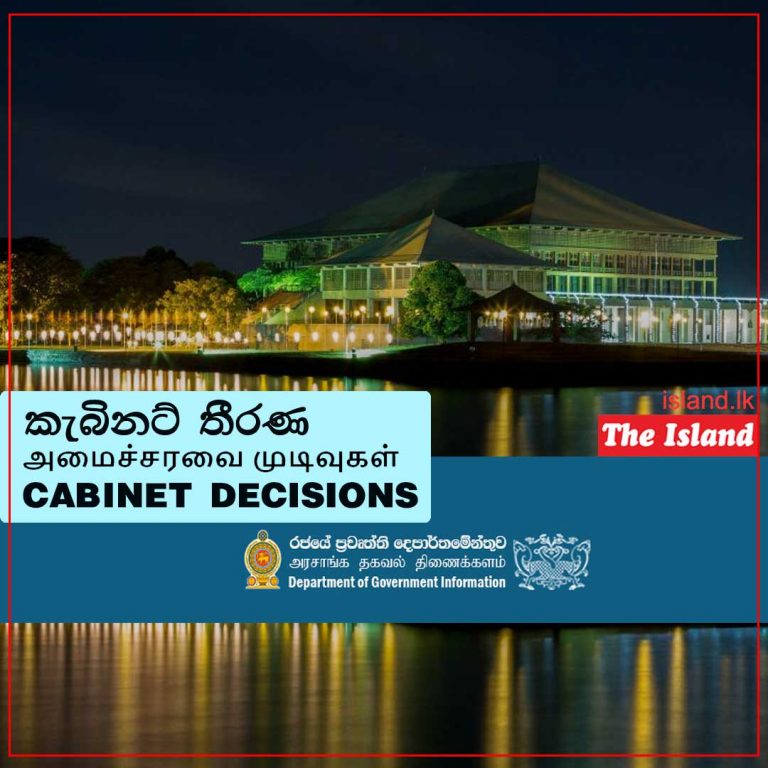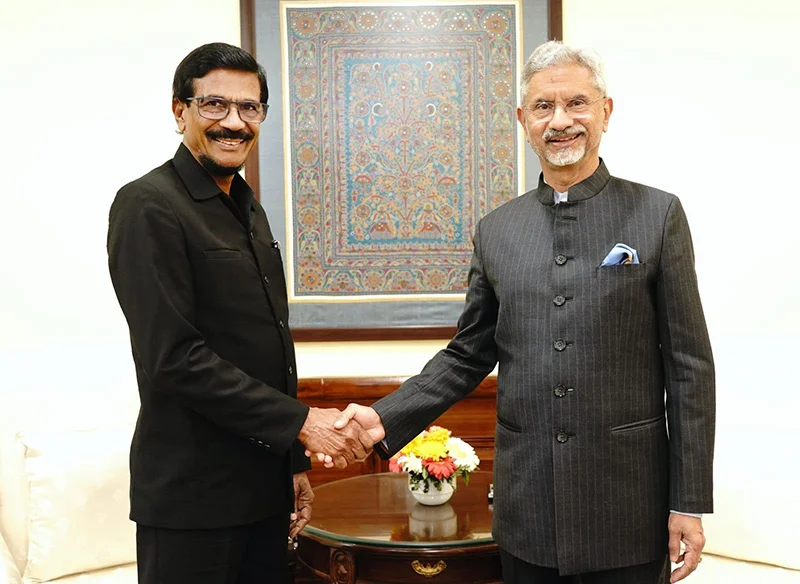News
Is Dr.N.M.Perera’s Solution of the 1970-75 Economic Crisis the Answer To Today’s Crisis ?

Commemoration of Dr.N.M.Perera’s 42nd Death Anniversary.
Sri Lanka’s economy is facing a deep economic crisis. But it is not alone in this situation. The whole world is in crisis. It is a systemic crisis that affects every country periodically, to a greater or lesser extent, at intervals of eight to ten years. These have led to much suffering to the people and the process of emerging from them has been very slow and painful. This is an inherent feature of the capitalist economic system.
Capitalism developed in the womb of feudalism in Europe leading to revolutionary upheavals like those of the French Revolution and the Cromwellian Revolution in England. But in the countries of the Third World like Sri Lanka or India capitalism did not arise from within, but were introduced from capitalist countries like Britain to exploit our human and material resources and markets, using the local (comprador) capitalist class, led by parties like the UNP in Sri Lanka.
Dr. N M Perera and emerging young intellectuals like Colvin R de Silva, Leslie Goonewardena, Philip Gunawardene and Dr. S A Wickremasinghe, when they were abroad recognized that this colonial subjugation would lead to perpetual poverty for the vast majority of the Sri Lankan people. A true understanding of the nature of capitalism and imperialism was achieved through a study of Marxism. They became Marxist revolutionaries committed to the defeat of capitalism and its replacement by socialism globally and thereby in Sri Lanka.
Dr N.M. Perera obtained a BSc, PhD and DSc from the prestigious London School of Economics of the London University. He was a favourite pupil of the legendary Prof. Harold J. Laski, who was also an advisor to the Labour Party, who said that NM had all the qualities needed to be an English Chancellor of the Exchequer (a Finance Minister). Following NMs return to Sri Lanka and his performance here, Sir Ivor Jennings who was then the Vice Chancellor of the only University of Ceylon, said that he had all the qualities required of a Labour Prime Minister in Britain. Instead of rising to great heights serving the British Empire that ruled the world, NM chose to serve the people of Sri Lanka by fighting to win independence from the British.
When NM and these Left leaders returned to Sri Lanka (Ceylon) they helped form the Suriyamal Movement to save the people whom the British rulers allowed to suffer from malaria without medicine and food. Dr. N.M. was referred to as “parippu mahattaya”, as he supplied these needs climbing steep hills by foot despite the presence of leeches and snakes, as there were few roads. In 1935 they (NM, Colvin, Philip, SA and Leslie) formed the Lanka Sama Samaja Party( LSSP). They devoted all their energy and income, day and night, to fight for the rights of our people against the British rulers and their local agents. Their main objective was winning complete independence (unlike the Dominion status that was given by the British to D.S. Senanayake and the UNP in 1948 to continue their exploitation here). Complete independence was finally achieved in 1972, overcoming UNP resistance, through the Republican Constitution drafted by Colvin as Minister of Constitutional Affairs in the Coalition Government led by Sirimavo Bandaranaike. This was 22 years after India as UNP and TNA resistance had to be overcome.
The second objective was to overcome poverty and injustice and narrow the rich minority /poor majority gap, by establishing a society with social equity , a “sama samajaya”. In Sri Lanka, like in the whole world , the rich poor gap is widening and society is becoming more unstable. With the global capitalist crisis, and the fall of the US and western economies and the rise of China purely by trade (without any imperialist conquests) the USA is now gearing for war to lift its economy which depends on arms sales, as it produces 60% of global supply. The aim is also to achieve regime change in China.
The LSSP also fought for 22 other demands and won many of them – free education, free health, the eight hour working day, overtime payment, pension, EPF and other rights. While doing all this, NM found time to attain many achievements; MP for Ruwanwella and Yatiyantota, Leader of the Opposition, Minister of Finance, a co-convenor of the global Group of 77 Ministers of Economics, the Mayor of Colombo and Leader of the LSSP from its inception upto his death. As an economist and political scientist he wrote copiously and was a popular speaker, in Parliament, and at public meetings; he went to all parts of the country and the world. He was a good sportsman and captained Ananda College at cricket.
But among his many achievements perhaps the most valuable is his overcoming the 1970/75 economic crisis in Sri Lanka. The crisis was a result of the adverse trade balance due to the policies of the 1965/70 UNP Government that wasted our limited forex on import of luxury goods as well as local products , hitting our farmers and SMEs. On top of this he was faced with the global capitalist downturn, the rise in the price of fossil fuels by seven times due to action by OPEC. Fertilizer prices rose by 422% in 1974. The world faced the worst drought for about 30 years during this period and food prices soared, with thousands dying in various parts of the world from starvation but no one died in Sri Lanka. The price of rice rose by 60% ( from 35 to 56 pounds per ton), flour by 65%, sugar by 323%.
The prices of food items have not gone up internationally on a similar scale today. It is far lower. The local market price has gone up due to massive profiteering by middlemen in Sri Lanka, specially millers and traders. Further the farmers are in the grip of money lenders as they are in a state of chronic debt. NM took measures to relieve rural debt. All essentials were supplied through a ration card at low prices through the Cooperative system that was functioning well. Producer and Consumer Cooperatives dealt with each other, getting rid of profiteering by middlemen (traders, millers etc.) in the process. We can gain by following NMs policies to tide over the present crisis.
( Prof. Tissa Vitarana)
News
Cabinet approves construction of new 300 bed Base Hospital in Deniyaya

The Cabinet of Ministers approved the resolution forwarded by the Minister of Health and Mass Media to relocate the Deniyaya Base Hospital after constructing a new hospital with a capacity of 300 beds at an estimated cost of Rupees 6,000 million.
The Southern Provincial Department of Health has acquired a plot of land in Handford estate which is approximately 03 kilometres away from the town for this purpose.
News
Cabinet nod to legally empower methodology for implementing the ‘Praja Shakthi’ poverty alleviation national movement

The Cabinet of Ministers granted approval for the resolution furnished by the Minister of Rural Development, Social Security and Community Empowerment to instruct the Legal Draftsman to draft a bill to legally empower the implementation of ‘Praja Shakthi’ (Strength of the Community) poverty alleviation national movement
News
NPP not under Indian pressure to hold PC polls – JVP

…preliminary work started on new Constitution
JVP General Secretary Tilvin Silva yesterday (17) maintained that the NPP government was not under Indian pressure to hold the long delayed Provincial Council elections.
The top JVP official said so appearing on Sirasa Pathikada, anchored by Asoka Dias. Tilvin Silva said that neither the devolution nor terrorism issues had been discussed during his meeting with External Affairs Minister Dr. S. Jaishankar and Deputy National Security Advisor Pavan Kapoor, in New Delhi. This was Tilvin Silva’s first visit to India.
Declaring that politics hadn’t been on the agenda, the JVPer said that the Indian focus was entirely on economic development and technology.
The JVP General Secretary visited India under the Indian Council for Cultural Relations’ (ICCR) Distinguished Visitors Programme from 5-12 February 2026. General Secretary Silva was accompanied by Kitnan Selvaraj, MP, Ilankumaran Karunanathan, MP, JVP Central Committee Member Janaka Adhikari, JVP’s Media Unit Head Hemathilaka Gamage and Member of JVP’s International Relations Department Kalpana Madhubhashini. The delegation visited New Delhi, Ahmedabad and Thiruvananthapuram.
Responding to another query, Tilvin Silva said that Dr. S. Jaishankar had reiterated that India would always remain a true and trusted partner for Sri Lanka, in accordance with its ‘Neighbourhood First Policy’ and Vision ‘MAHASAGAR.’
Referring to the second JVP insurrection in the late 1980s, the JVPer claimed that they had not been against India but responded to the actions of the then Indian government.
Sri Lanka enacted the 13th Amendment to the Constitution in the wake of the Indo-Lanka peace accord of July 1987 to pave the way for Provincial Councils.
Tilvin Silva said that since they came to power, Indo-Sri Lanka relations had changed. “India has realised we could work together,” he said.
The JVP official said that preliminary work was underway, regarding the formulation of a new Constitution. The abolition of executive presidency and creation of an Office of President sans executive powers, too, would be addressed, he said, adding that the strengthening of the legislature was the other issue at hand.
Pointing out that the NPP had 2/3 majority in Parliament and could introduce a new Constitution on their own, Tilvin Silva said that they intended to obtain views of all and study the past processes in a bid to secure consensus. The JVP, as the party that campaigned against the introduction of executive presidency, way back in 1978, would lead the current effort to do away with the existing Constitution, he said.
Tilvin promised that they would implement what was in their manifesto.
The interviewer also raised the issue of abolishing the pensions for ex-Presidents. Tilvin Silva said that the Supreme Court, too, had approved the move to abolish pensions to ex-MPs. Therefore there was no issue with that, however, the ex-Presidents pensions couldn’t be done away with as they were made through the Constitution. That would be addressed when the government introduced a new Constitution in consultation with other stakeholders.
By Shamindra Ferdinando
-

 Life style3 days ago
Life style3 days agoMarriot new GM Suranga
-

 Business2 days ago
Business2 days agoMinistry of Brands to launch Sri Lanka’s first off-price retail destination
-

 Features3 days ago
Features3 days agoMonks’ march, in America and Sri Lanka
-

 Opinion6 days ago
Opinion6 days agoWill computers ever be intelligent?
-

 Features3 days ago
Features3 days agoThe Rise of Takaichi
-

 Features3 days ago
Features3 days agoWetlands of Sri Lanka:
-

 News3 days ago
News3 days agoThailand to recruit 10,000 Lankans under new labour pact
-

 News3 days ago
News3 days agoMassive Sangha confab to address alleged injustices against monks













